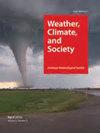南佛罗里达州移动家园公园居民的飓风脆弱性和受限选择
IF 1.9
4区 地球科学
Q3 ENVIRONMENTAL STUDIES
引用次数: 0
摘要
南佛罗里达州是美国海岸飓风脆弱性最高的地区之一。佛罗里达州南部的流动房屋社区特别容易受到飓风的影响,这是由于房屋或土地的结构完整性较弱,以及结构和社会人口因素的混合。进行了一项混合方法研究,以评估布劳沃德县和迈阿密戴德县永久移动家园公园(MHP)居民对飓风风险的认知、经验和决策。2016年7月,在佛罗里达州南部经历了几年的名义飓风活动之后(在2016年9月飓风马修形成之前),分发了邮寄回复调查,并于2018年5月,即飓风“伊尔玛”2017年9月登陆八个月后,在MHP进行了重点小组调查。对44份亲自调查和57份邮寄调查回复的定量分析显示,受访者往往年龄较大、退休或失业,受教育程度适中,其中许多人表达了飓风马修之前的社会和结构层面飓风风险。对飓风“伊尔玛”后进行的六次焦点小组讨论进行的定性分析显示,居民所经历的限制和脆弱性整合为几个主要主题,涉及准备、疏散、援助、压力和焦虑、树木问题和恢复。与会者特别强调了他们对MHP飓风之前、期间和之后出现的树木危害、损坏和维护问题的担忧。这些结果建立在关于飓风风险的学术基础上,强调了居住在MHP的居民的结构和社会脆弱性,这些脆弱性限制了建筑复原力、适应能力、社区恢复工作,并倡导政策变革。这项研究旨在了解在佛罗里达州南部经历了长达十年的飓风干旱后,移动家庭公园居民对当地飓风风险的看法、经历和脆弱性,并了解居民在大型飓风后面临的障碍。飓风干旱是研究的关键,因为它会侵蚀个人和社区层面的准备。移动家庭公园的居民在飓风期间可能会经历更多的洪水、大风、龙卷风和其他危险。居民还面临着县、社区和家庭层面的结构性脆弱性,这些脆弱性限制了他们在飓风防备、风暴期间的安全以及风暴后的恢复能力方面的选择。我们的研究使用各种形式的数据收集,从佛罗里达州南部移动家园公园的永久居民那里获得见解。此外,它还讨论了政策制定者在气候变化风险管理中可以解决的社会和经济劣势以及机遇。本文章由计算机程序翻译,如有差异,请以英文原文为准。
Hurricane Vulnerability and Constrained Choices among Mobile Home Park Residents in South Florida
South Florida experiences some of the highest coastal hurricane vulnerability in the United States. Mobile home communities in south Florida are particularly vulnerable to hurricanes due to the weaker structural integrity of the home or land and a mix of structural and sociodemographic factors. A mixed-methods study was conducted to assess hurricane risk perceptions, experiences, and decision-making among permanent mobile home park (MHP) residents in Broward and Miami-Dade Counties. Return-by-mail surveys were distributed in July 2016 after several years of nominal hurricane activity in south Florida (and before Hurricane Matthew’s formation in September 2016), and focus groups were conducted at MHPs in May 2018, eight months after Hurricane Irma’s September 2017 landfall. Quantitative analysis of 44 in-person and 57 return-by-mail survey responses revealed that respondents tended to be older, retired, or unemployed and had modest levels of education, with many expressing forms of social- and structural-level hurricane risk before Hurricane Matthew. Qualitative analysis of six focus group discussions conducted after Hurricane Irma revealed that the constraints and vulnerabilities experienced by residents coalesced into several primary themes related to preparation, evacuation, assistance, stress and anxiety, tree concerns, and recovery. Participants specifically highlighted their concerns about tree hazards, damages, and maintenance issues arising before, during, and after hurricanes in MHPs. These results build on the scholarship on hurricane risk by underscoring the structural and social vulnerability of residents living in MHPs that constrain building resilience, adaptive capacity, community restoration efforts, and advocating for policy changes.
This study aims to understand local hurricane risk perceptions, experiences, and vulnerabilities among residents of mobile home parks after a decade-long hurricane drought in south Florida and also to understand the barriers residents faced after a major hurricane. A hurricane drought is critical to study because it can erode individual and community-level preparedness. Residents of mobile home parks may experience more flooding, higher winds, tornadoes, and other dangers during hurricanes. Residents also face county-, neighborhood-, and household-level structural vulnerabilities that restrict their options related to hurricane preparedness, safety during a storm, and resilience in its aftermath. Our study uses various forms of data collection to obtain insights from permanent residents of mobile home parks in south Florida. In addition, it discusses the social and economic disadvantages and opportunities that policy makers can address in climate change risk management.
求助全文
通过发布文献求助,成功后即可免费获取论文全文。
去求助
来源期刊

Weather Climate and Society
METEOROLOGY & ATMOSPHERIC SCIENCES-
CiteScore
3.40
自引率
13.60%
发文量
95
审稿时长
>12 weeks
期刊介绍:
Weather, Climate, and Society (WCAS) publishes research that encompasses economics, policy analysis, political science, history, and institutional, social, and behavioral scholarship relating to weather and climate, including climate change. Contributions must include original social science research, evidence-based analysis, and relevance to the interactions of weather and climate with society.
 求助内容:
求助内容: 应助结果提醒方式:
应助结果提醒方式:


